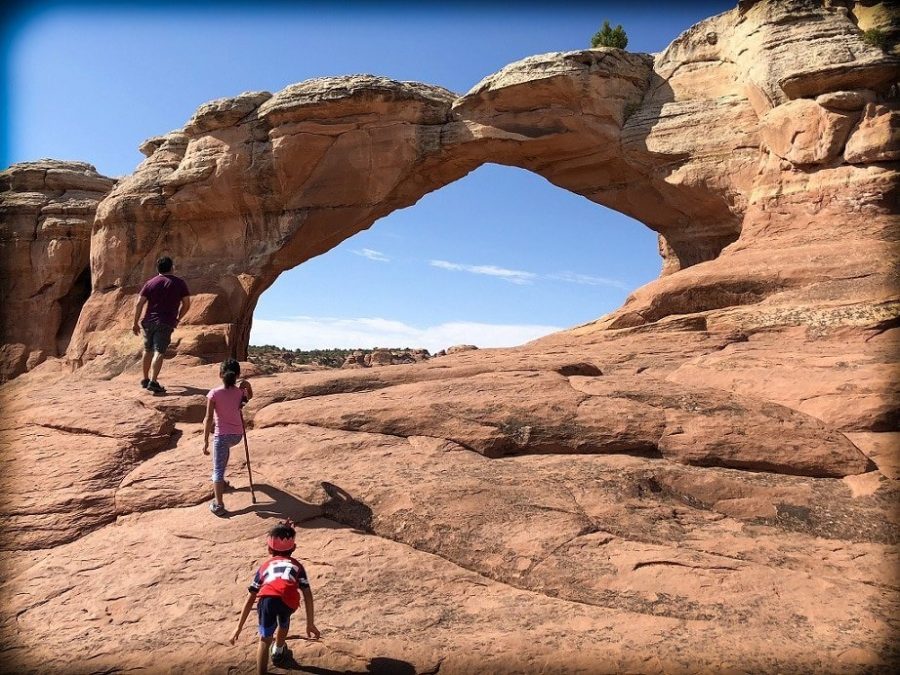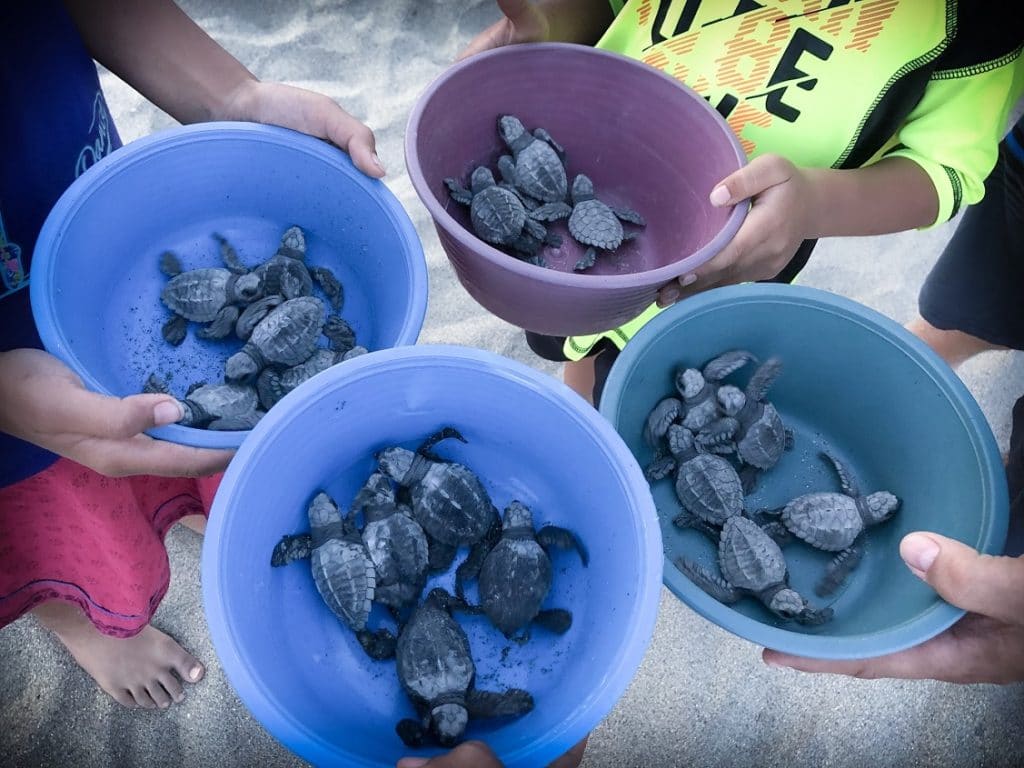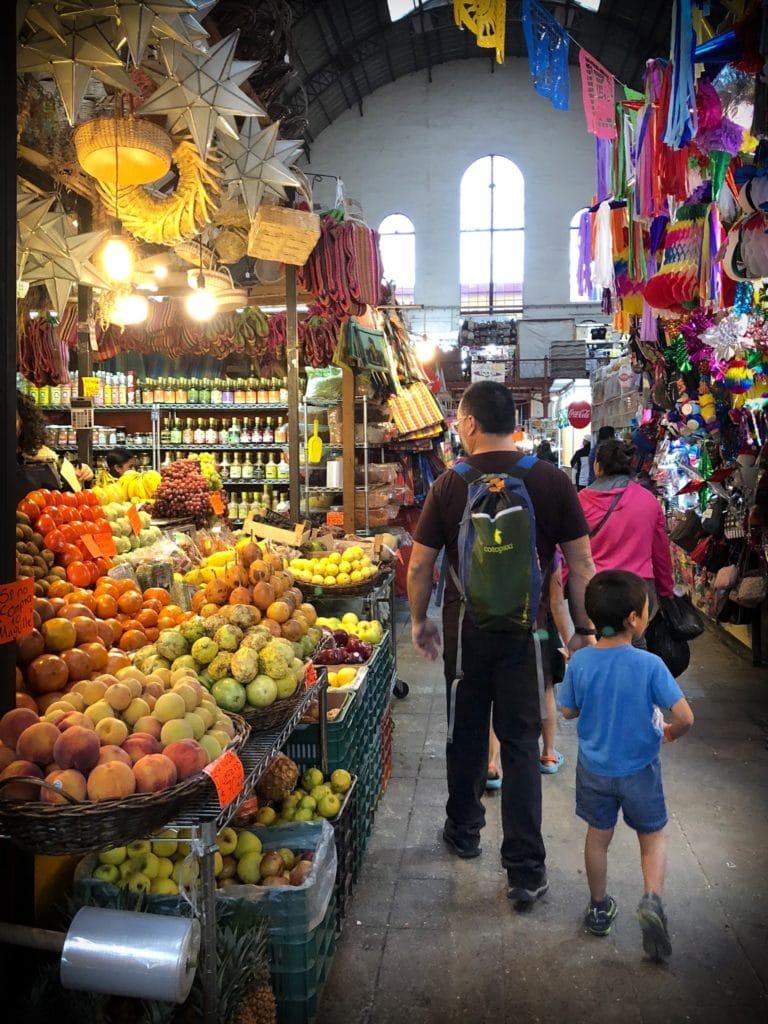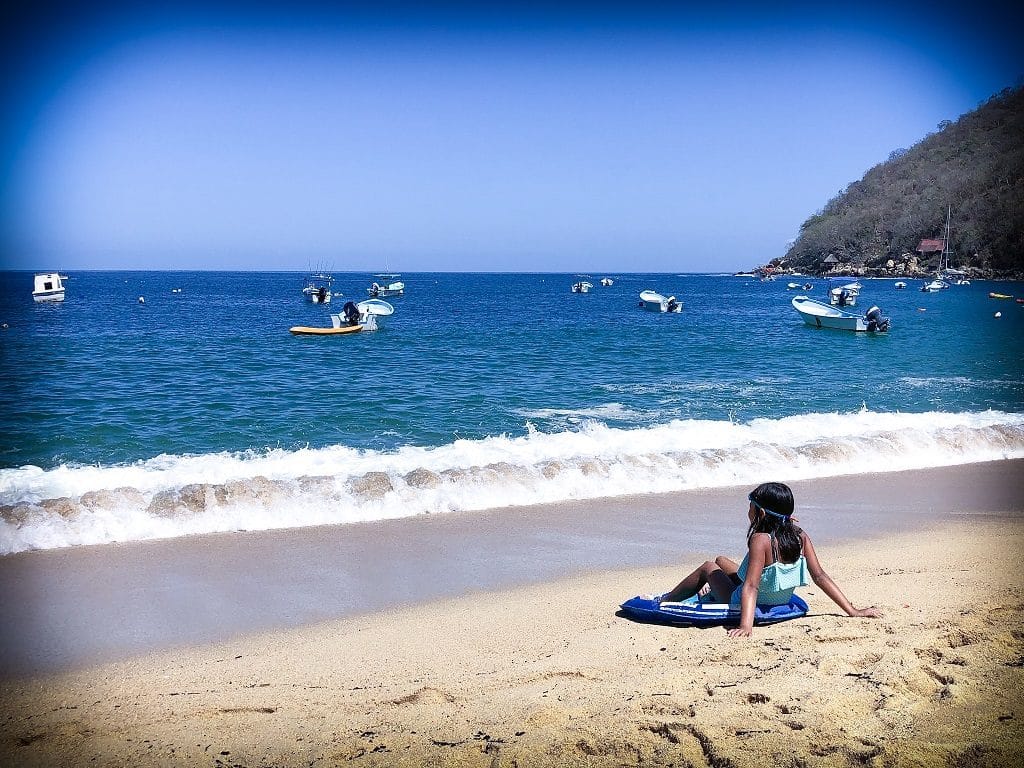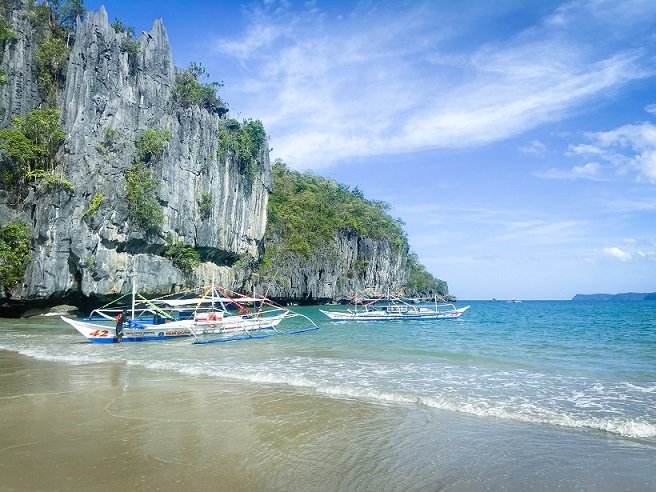9 Impactful Responsible Travel Tips For Families
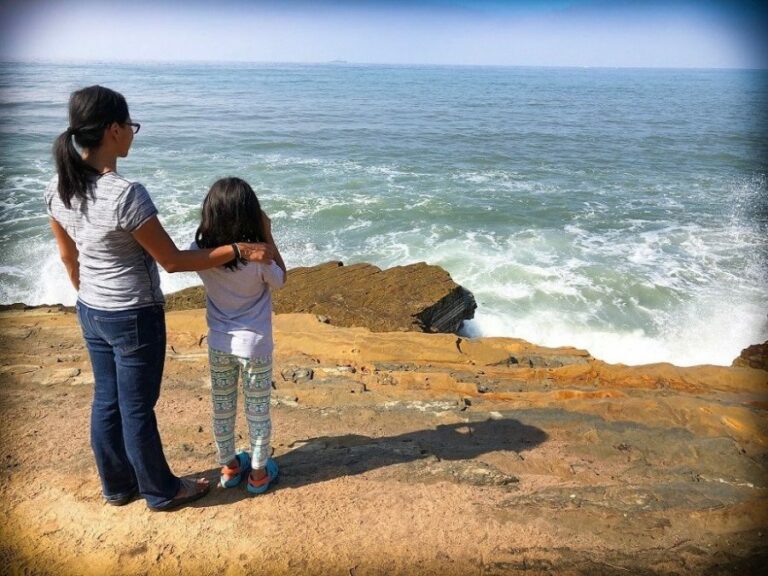
As a traveling family who cares about sustainability, we're always on the lookout for responsible travel tips and various ways we can travel more sustainably and ethically.
Over the years, I've had many conversations with families about our responsibilities as travelers, especially within my Responsible Family Travel Facebook group. I know I'm not the only one who cares about responsible and ethical travel.
Throughout our travels, we've been fortunate to work with travel companies operate with a responsible tourism lens in mind. We've had amazing trips swimming with whale sharks in Mexico and exploring Ubud activities in Indonesia with travel companies who are sustainably minded.
Unfortunately, the topic of responsible travel isn't always something that is top of mind for all families who travel. And I feel like that needs to change. So I thought I'd put together a list of some responsible travel tips to help families be more mindful as they travel in this world.
This post was updated on April 9, 2021.
This post may contain affiliate links. That means I may receive a small commission if you click on the link and purchase something. But don't worry, this will not result in any extra costs to you.
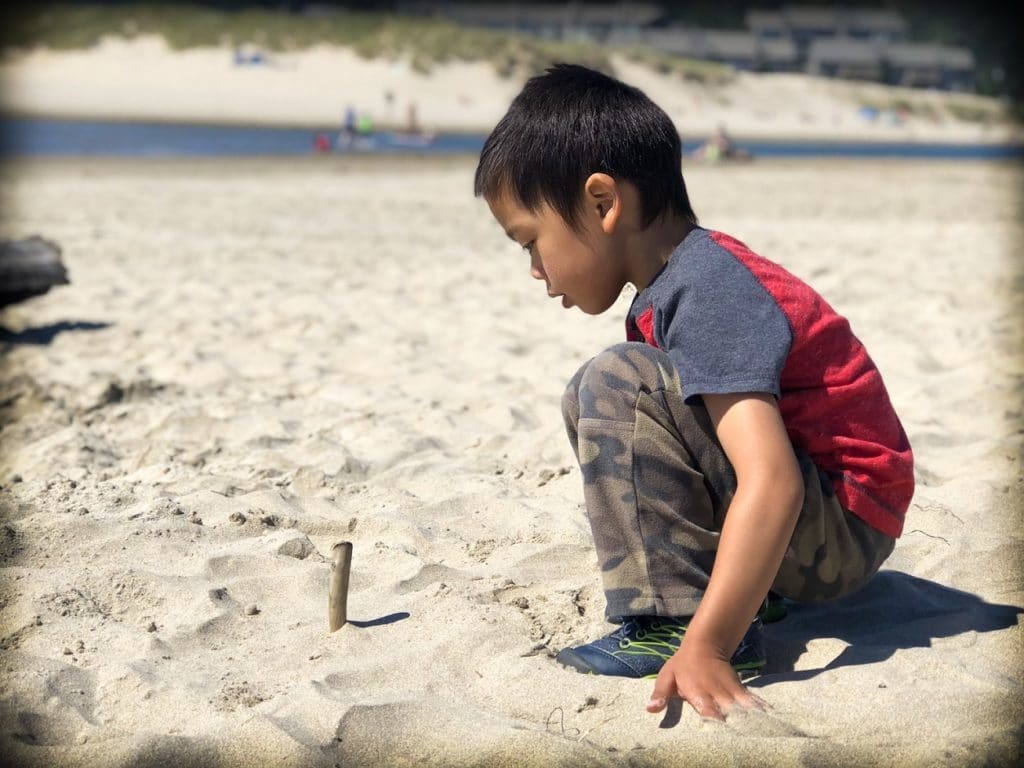
Going beyond the obvious responsible travel tips
Underscoring all my travel experiences is the understanding that we have a responsibility as travelers to make sure that we leave the world just the same as we saw it (or even better). This is the essential idea behind my responsible travel tips.
The problem is, many people limit responsible travel to helping the environment or volunteering somewhere. There’s actually more to responsible travel and ethical travel than that!
Being responsible means being mindful of your actions as a traveler. It involves thinking about the unintended consequences of all the things you do when you travel.
This can be booking a hotel, buying a meal, or taking a picture. I’ve written about how to practice ethical family travel before. And I have also provided several simple responsible travel tips in that post for how families can engage in more ethical travel.
Dive deeper into the topic of responsible family travel here.
Understanding the travel code of ethics
If all of this sounds overwhelming, don’t worry. Traveling responsibly doesn’t have to be hard. But it does take a bit of education and effort.
I don’t claim to be the perfect responsible traveler. There are definitely moments in our travels where I question whether what I do is the right thing. But to me, the most important thing is mindfulness. We need to constantly be aware of our actions.
One thing that helps with awareness is following a travel code of ethics. In 1999, the United Nations World Tourism Organization (UNWTO) issued the Global Code of Ethics for Tourism. It’s not widely publicized, but it’s a perfect set of standards that tourists can follow if they want to practice responsible travel.
The travel code of ethics outlines ten principles that governments, travel companies, travel communities, and even individuals can follow to make travel a force for good. And I've found this code to be helpful worldschooling resource that families can use when thinking about responsible travel tips.
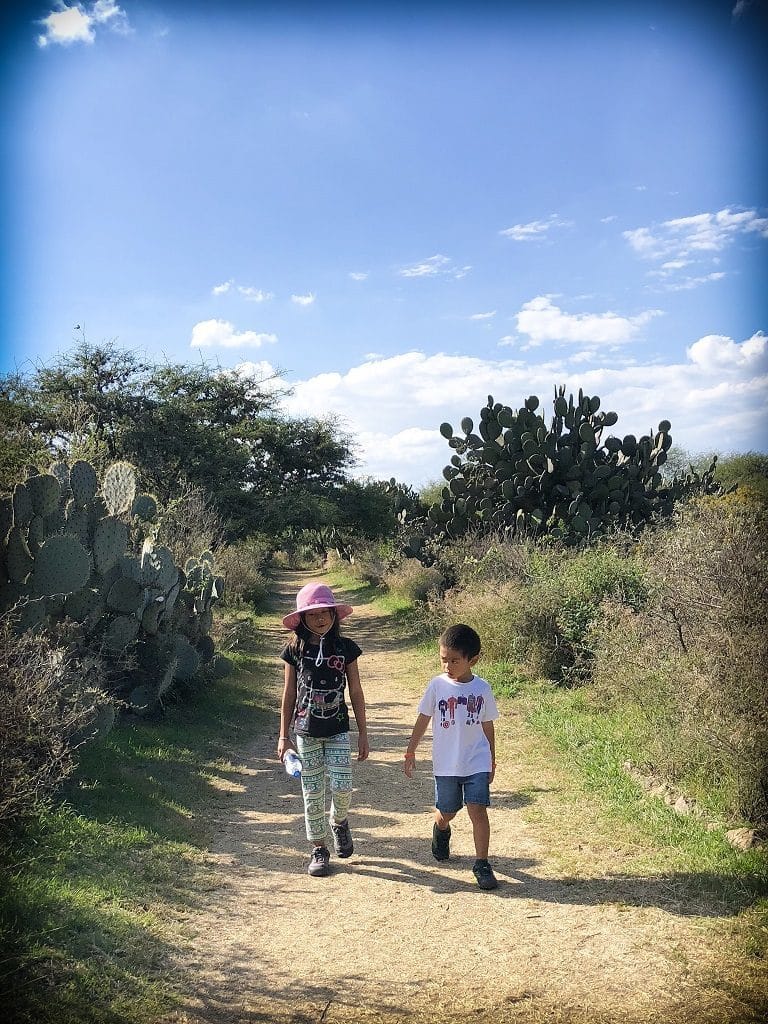
Responsible travel tips to follow
As travelers, you can use these principles as a basis for the choices you make when you travel. At first, it may seem like a chore to think through these principles. But once you start doing it, the practice will eventually become second nature to you.
Here are some easy to do responsible travel tips that you and your family can use, based on the travel code of ethics.
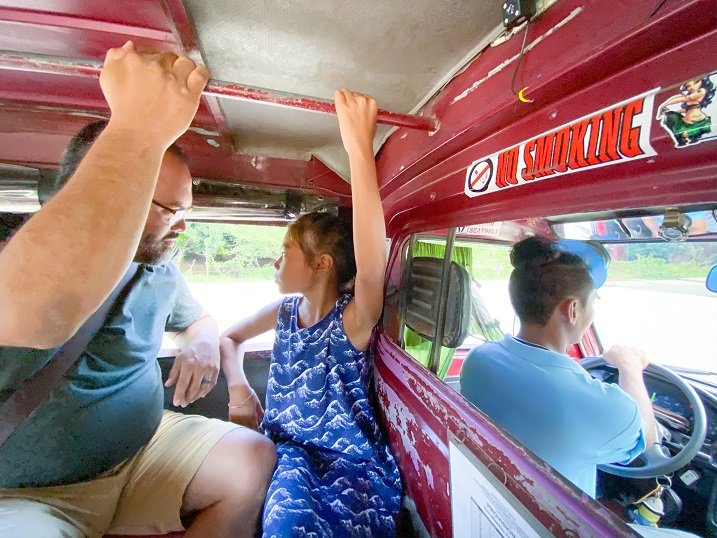
1. Be respectful of the people and societies you encounter
The first principle of responsible travel involves being respectful of the places you visit and the people you encounter. Specifically, it means making an effort to know the basic cultural norms. It also means respecting the laws and social rules of that country.
When we travel to a new destination, we try to spend some time getting to know the do’s and don’ts of that place. We’ll do this by watching YouTube videos, checking out books from the library, or reading blog posts about that destination. For example, when we visited Pura Lempuyang in Bali (famously known as the Gates of Heaven), we made sure to brush up on the do's and don'ts of visiting a Balinese Hindu temple.
We also like to learn a few key phrases in the language of that country. Again, YouTube is a great resource as there are countless language-learning channels to choose from. But language learning apps like Duolingo are also good resources.
For our time in Italy, we used Rick Steve’s Italian phrase book to learn some Italian phrases. And when we were in Mexico, we used a combination of Duolingo and in-person Spanish lessons to learn Spanish for travel.
Attempting to communicate in the language of the country you’re visiting, rather than assuming that people speak your language (in our case, English) goes a long way in showing people that you respect their culture. It's one of the easiest responsible travel tips to follow.
Want to learn about one of my favorite countries in the world? Take a look at the many reasons why I love Mexico and its culture!
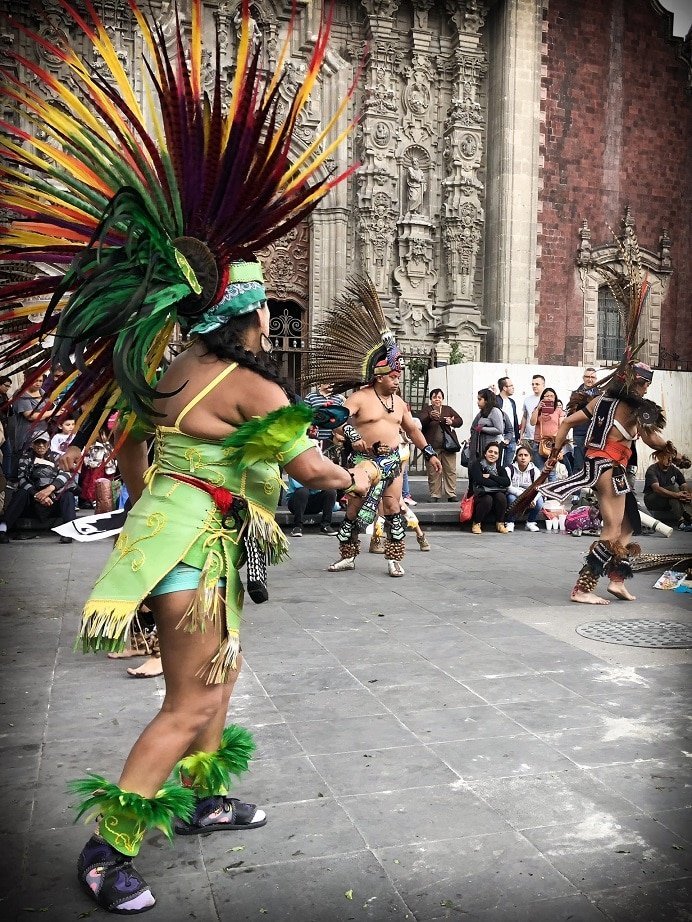
2. Approach travel as a means towards enrichment rather than just entertainment
A second principle in the travel code of ethics is that travel shouldn’t just be a form of entertainment. Travel can also be something that is enriching for yourself and for the greater community.
When you travel somewhere, take time to learn something from your travels. You can do this at the macro level (understanding the role of that destination in the greater context of world). And you can also do this at the micro level (understanding the roles that groups play WITHIN that country).
We like to take cultural or historical tours when we travel. We especially like taking it from someone who has a personal connection to that culture. In San Miguel de Allende, Mexico, we did a food tour to learn about the local culture and history. We also took a cooking class in Puerto Vallarta. While in Costa Rica, we took a chocolate workshop to learn about the history of chocolate. And in Indonesia, we did a Bali day tour, where we learned about life in a traditional Balinese home.
This set of responsible travel tips is especially useful for worldschooling families. Make learning part of your travel experience by visiting a local museum, cultural center, or historical center. It's an easy way to gain some enriching traveling experiences.
One travel company I like is Urban Adventures by Intrepid, which focuses on local cultural tours for families. Take a look at the tours they offer, and book one for your next family trip.
Take a look at other ways you can incorporate worldschooling into your travels here.
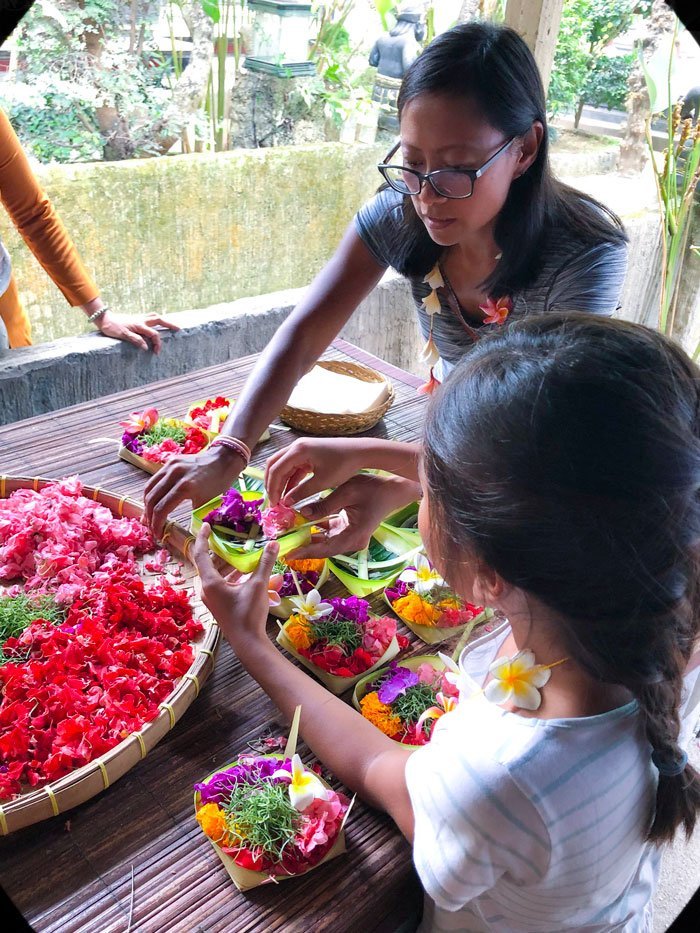
3. Actively practice sustainability
A key component of responsible travel is a focus on sustainability. In the context of the travel code of ethics, this means a focus on the environment. But it also means a focus on the local community. Essentially, whatever you do in travel, you want it to be something that future generations can also enjoy, and that will benefit the local community.
Some responsible travel tips for families in this area is to do activities that help to preserve the environment in a responsible way. For example, in the United States, we like to support and visit the National Parks. Our kids like taking part in the Junior Ranger programs. These programs help them learn about nature, and also encourages them to be good stewards of the environment. And when we were in Mexico, we had a chance to release baby sea turtles into the ocean.
When it comes to sustainable travel practices, making an effort to reduce our reliance on single-use plastic is also important. We carry a water bottle that has a filter and water purifier, so that we don’t have to constantly buy bottled water. We also like to carry around stainless steel drinking straws. These straws are fairly easy to clean and wash.
Here are some of the sustainable travel products we travel with that you can buy for yourself:
GRAYL water bottle with purifier and filter
ALINK stainless steel drinking straws
Foldable reusable grocery bags
Tru Earth biodegradable laundry detergent sheets
Check out these other travel must haves that we use for our world travels.
4. Preserving and enhancing our cultural heritage
The fourth principle in UNWTO’s travel code of ethics is a focus on preserving historical, archaeological, and cultural sites and activities. When you’re traveling somewhere, find ways to learn about the historical significance of a destination.
For our family, we like visiting UNESCO world heritage sites. Over the years, we’ve visited 23 UNESCO sites together, in North America, South America, Asia, and Europe!
One of the most important aspects of this set of responsible travel tips, especially when you’re visiting historical places, is to be respectful of the rules. These rules are meant to help preserve the historical artifacts, so that future generations can visit that place too.
Too many times, I’ve seen travelers disregard the rules, just for a selfie or a photo op. During our visit to the Leaning Tower in Pisa, for example, we saw many tourists posing for pictures in the grass, even though there were clearly marked signs advising people not to walk on the grass.

5. Responsible travel tips for supporting the local community
When it comes to responsible travel, supporting the local community is extremely important. This set of responsible travel tips is also relatively easy to do for families. We like frequenting local businesses and restaurants. We also like shopping at local markets. However, the intention of supporting the local community can be a complicated issue. Sometimes the actions that you think are beneficial may have unintended negative consequences to locals.
One example is accommodation. Our family has always been a supporter of Airbnb since its inception. For traveling families, it just makes more sense financially to choose an Airbnb over a hotel because of the extra space and access to a kitchen.
But over the years, Airbnb has received criticism for pushing renters out of neighborhoods, as property owners choose to offer their units for short-term rentals rather than long-term rentals. For our family, we try to counter some of the negative impacts of Airbnb by choosing units owned by locals.
Another area that we often struggle with is money. Specifically, when it comes to paying local prices. Overpaying for an item may create a precedent or expectation that all tourists are willing to pay more. This can inadvertently raise prices for locals.
Likewise, giving unsolicited money to people, with the intention of "helping them out”, can also breed animosity among others in their community who didn’t receive any money. As always, it’s important to think about the context of the situation.
6. Don't be afraid to hold the travel industry accountable for their actions
Responsible travel isn’t just for travelers. It's also for the other players in the travel industry: governments, travel companies, travel promoters, and even influencers and writers. All players in this industry need to make sure they are being honest in the services they offer, and the information they provide.
As travelers, part of our responsibility is holding others accountable for their actions. If a company is doing something ethically wrong, let them know in an email or send a message. If a blogger is providing misinformation about a destination, make a comment about it to correct them. My biggest peeve is when I see bloggers and influencers refer to Bali as a country. It's actually an island in Indonesia. I have no hesitation in correcting them when I see it happen.
One thing to note, though, is to always be respectful. Public shaming on the internet should not be okay. We should always extend common courtesy and manners towards others, even if we are providing criticism.

7. Advocate travel for ALL people
One of the principles I love from the UNWTO travel code of ethics is the idea that travel is a right for all people. Essentially, everyone should have the right to travel. It doesn’t need to be limited to a select few. This idea is a part of my own personal beliefs. And I often work to advocate for all kinds of people to travel, including advocating for more diversity in travel. I love seeing and encouraging families of color and LGBTQ families to travel in the world.
As you’re thinking about how your family can practice responsible travel, consider whether you’re supporting companies that allow their employees to travel. This information may not be readily available. But you can always ask by sending an email.
Another consideration is to look for companies that make travel accessible for everyone. This includes people with disabilities. This group of travelers is often overlooked, because their needs are so varied. But it’s important to support the companies that are making the effort to allow people with disabilities to travel more.
Want to follow some diverse families who travel the world with their kids? Take a look at these inspiring family travel blogs.
8. Acknowledge your privileges as a traveler
As a traveler, we have certain rights. According to UNWTO, tourists should have the right to travel within their own country, and into other countries. They have the right to have access to accommodations and transportation. Unfortunately, not everyone has the ability to exercise these freedoms.
Passport privilege refers to the ability of passport holders from certain countries to travel more freely (and cheaply) among countries, in comparison to other passport holders. The Global Passport Power Rank is a site that ranks passports by the number of countries they are able to enter (without a visa, or with a visa-on-arrival).
Currently, passport holders from Germany have the most powerful passports. Their passports allow them to enter 134 countries either without a visa or by getting a visa-on-arrival. While the United States currently ranks 45th in ranking, we still hold some passport privilege. As US citizens, my family and I can enter 105 countries, 63 of those countries are visa free.
Acknowledging your passport privilege is an important part of ethical travel. It’s understanding that not everyone has the ability to travel the way that we might be able to. For citizens of countries with more restrictive passports, travel is prohibitively more expensive.
Take a look at these age-appropriate ways to teach your kids about travel privilege.
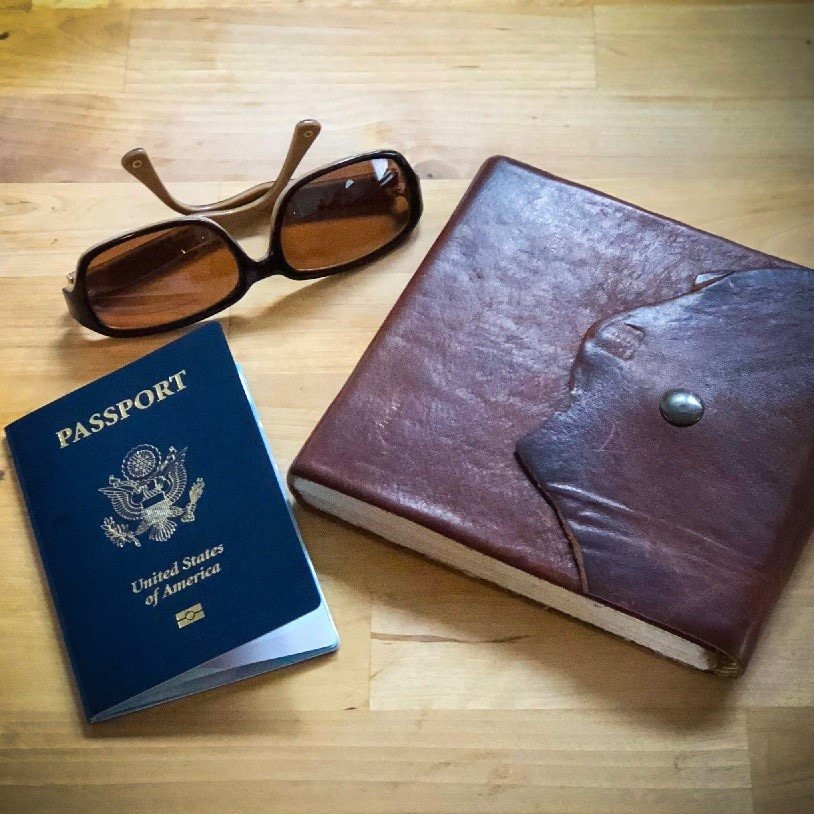
9. Promote the rights of workers in the travel industry
Another important principle of responsible travel is advocating for the rights of workers in the travel industry. Workers and entrepreneurs in the travel industry have a right to a fair wage, fair prices, and fair labor standards. How ethical is it to be sipping mai tais on the beach, when the server who made that mai tai is working 16 hour days (not by choice)? When possible, choose hotels, restaurants, and companies that do not exploit their workforce. And choose companies that treat their employees fairly.
Another aspect of promoting workers is when it comes to voluntourism. You may think that taking a volunteer trip to work on a farm or build houses is a noble and selfless activity. But consider the worker you may have displaced in the process.
Unless you’re a contractor or carpenter by trade, do you really have more skills to build a house than a local carpenter? Working on a farm may be unskilled work, but are there others in that country without jobs that could be doing that work instead? Is the organization or company asking for volunteers because they don’t want to pay for labor? If so, should you be supporting an organization or company like that?
There are no right answers on this. But it is important to consider whether your presence as a volunteer is preventing a local from receiving a job.
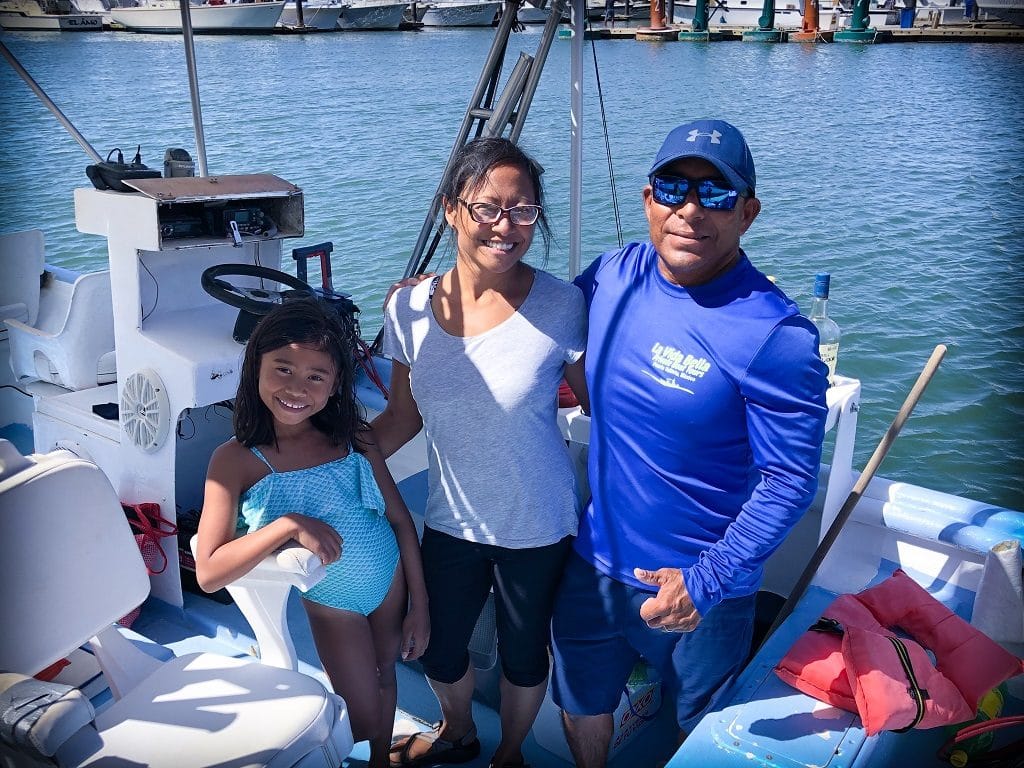
Make these responsible travel tips a priority for your family
Making responsible travel a part of your family culture may take time. But it is possible. Our family didn’t start thinking about this until a few years ago. And it wasn’t until we were traveling full time that we started making an active effort to practice ethical travel.
Even now, there are still moments when we question whether a particular choice was the right thing to do. We still struggle with finding sustainable forms of transportation. Or we struggle with choosing where to stay when we travel.
For your family, mindfully practising these principles from the travel code of ethics is a good step towards becoming a more responsible traveling family. Discuss what responsible travel means for your family with your partner. And also discuss it with your kids. Make ethical travel an important part of your travel decision making. Eventually, it will become second nature to you.
Do you already practice responsible travel? Share your responsible travel tips in the comments!
If you're curious about how to incorporate responsible travel into a longer term travel lifestyle, get my gap year planning guide, Hey Kids, Let's Go Travel!
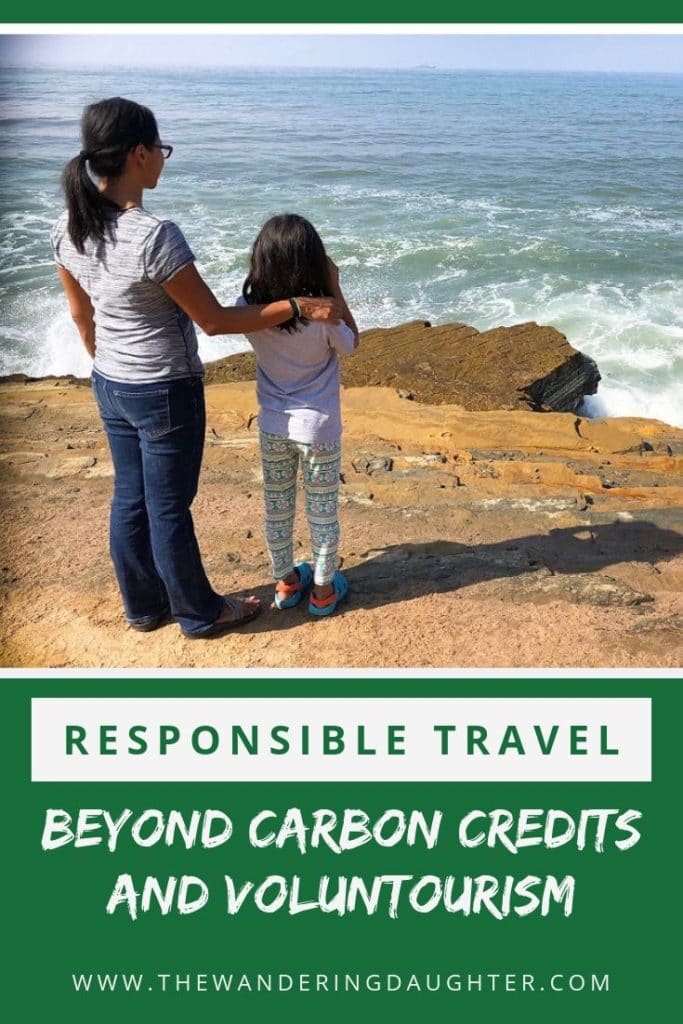
Need help thinking through how to budget for a family trip? My Travel Budget Worksheet is just the tool you need! Click here to receive your free copy by signing up for my newsletter.
Want to connect with me on social media? Find me on Facebook, Instagram, Pinterest, and Twitter. And for those of you who are dedicated to traveling more responsibly, sustainably, and ethically, join over 200 like-minded families on my Facebook group, Responsible Family Travel.

